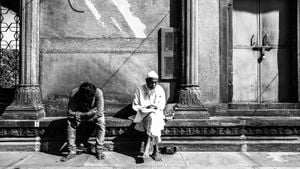Germany's political climate is rocketing toward upheaval as the Christian Democratic Union (CDU) finds itself entangled with the far-right Alternative for Germany (AfD) party amid rising public anxiety around immigration. Party leader Friedrich Merz has made news for his dramatic pivot toward harsher immigration policies, directly engaging the AfD's support to bolster his hardline stance.
With the national elections looming on February 23, 2025, Merz's decision surfaces as both strategic and controversial. Following unsettling incidents involving asylum seekers, particularly the tragic stabbing of two individuals, including a toddler, and the horrifying car-ramming attack at a Christmas market, the demand for change has surged. The CDU aims to reclaim political ground as it faces accusations of alienation from mainstream political values.
Merz, who has traditionally centered his campaign on economic advancement, has suddenly reoriented his focus toward immigration—a tactic seen as politically charged and perilous. With the CDU trailing the AfD's popularity, Merz's approach appears to be one of desperation against the backdrop of extreme right-wing movements sweeping through Europe. On January 29, he proposed stricter border regulations and asylum laws, aiming to turn the narrative toward the CDU's capability as protectors of national security.
These shifts came swiftly after the tragedies captured national headlines, with Merz declaring we must "put out the fire and not let it become wildfire" during parliamentary debates. Critics, including current Chancellor Olaf Scholz, have lambasted his tactics, claiming this alliance undermines the moral integrity of the CDU and breaches the long-standing "firewall" between mainstream parties and the hazardous far-right. The SPD leader warned of the dangers of emboldening the AfD, indicating the perilous nature of mixing liberal governance with extremist elements.
The CDU's recent moves, including unprecedented support for policies crafted alongside the AfD, sparked heavy citywide protests, where demonstrators chanted phrases like "We are the firewall" and expressed resentment toward Merz's cooperation with such groups. This backlash was compounded by notable criticisms from within former chancellor Merkel's camp, who condemned the party's direction as dangerously misguided and at odds with historical lessons from Germany's turbulent past.
Angela Merkel's rare re-entry to daily political discourse emphasized the gravity of Merz's decisions. During public assemblies, she called such tactics "wrong," criticizing Merz’s breakdown of barriers to extreme right collaboration. Her forceful reminders of history resonate with many voters, igniting fears of repeating past mistakes. Following her remarks, Schulz emphatically placed Merkel's autobiography on his parliamentary desk—to reiterate her core values and warn against the folly of pandering to right-wing populism.
Despite this tumult, Merz remains the frontrunner for the chancellorship, holding high hopes to capitalize on the volcanic pressures around immigration. He argues his position stems not from collaboration with the AfD but rather the necessity to secure immigrants threatening public safety. "A right decision doesn't become wrong just because the wrong people agree to it," he contended, marking out his rationalization for seeking this path.
While Merz’s almost explosive approach questions his ability to govern effectively, it brings to the forefront the division within the electorate. His high-stakes gamble has reframed the discussion, juxtaposing measures meant to deter harmful migration against accusations of racism, and reflecting the pressures of acute public safety. Advocates for refugee rights, like Amnesty International, counter these policies, positing they would not have prevented the attacks blamed on migrants and would instead adversely impact the rights of legitimate refugees.
With the subsequent legislative bill’s rejection, Merz faces significant backlash as it would have served to augment federal police powers under the pretext of responding to public outcry. While the CDU had maintained its leading position, the growing support for the AfD serves as both warning and influence. Political scholars and analysts closely monitor these developments, exploring whether this marks the dawn of far-right influence becoming cemented within mainstream politics.
Looking beyond immediate election outcomes, the implicit consequences of opening collaborative channels with the AfD set the stage for potential governance structures at the conclusion of the electoral race. Given Germany's history of establishing policies marked by negotiations and consensus, the dynamic established by Merz gestures toward altering the foundational nature of political engagement within the country.
It remains to be seen how this political gamble will conclude. Merz’s efforts to navigate this rapidly changing environment might solidify his party's relevance or plunge it headlong toward divisions reminiscent of Italy or France. The CDU must reconcile fluctuated internal loyalties as they tread the ever-thin line between safeguarding traditional values and accommodating extreme approaches amid growing populism. Amid detours, pressures, and pivotal historical assignments, Germany may face uncharted adaptations as the elections draw closer.



